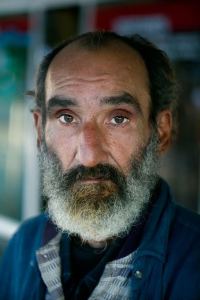I heard somebody banging at the front door. Dogs were barking like they never bark at this time of the day. Being well aware of the current situation in the island, I immediately knew that there must be a group of parapolice, who had come to my house to perform an act of repudiation.
As I was getting up from the bed, the banging continued. This time, its urgency was increased by an authoritative voice ordering me to open the door.

It was so early in the morning that there were no shadows yet. I groped my way to the door and when I opened it, a uniformed man stepped forward. Behind him, there was a heterogeneous group of people waiting for their turn to scold me. They were members of the infamous Rapid Response Brigades.
Someone who acted as the director of the wrathful orchestra shouted “One, two, three,” and the people obediently began to cry epithets that they had prepared for me: “Mercenary”, “traitor”, “terrorist”, “spineless creature” were among the most repeated ones.
That happened in 2005 – two years after the Black Spring and the subsequent wave of repression, which resulted in the arrest of 75 political opponents, of whom over twenty were independent journalists. And a year after I started to work as an independent journalist myself.
My articles reflecting the Cuban reality as it was, without embellishments and understatements, had annoyed the guardians of the Communist Party ideology, who decided to crush me with the most powerful weapon against dissidents that they had in their arsenal: fear.
When the government wants to inspire fear in somebody, it often uses the Rapid Response Brigades – a dispersed mass of manipulable individuals who, for various reasons such as ideological commitment, opportunism, joy of defamation or simply for fear, condescend to abusing and even to beating up political opponents.
The hard core of these Brigades is formed by militant communists, who are usually accompanied by ordinary citizens recruited from workplaces across the island. These are either hoaxed or compelled to participate in acts of repudiation against “political heretics”.
As it was the first time I was facing such a situation, the hysterical screams of the tumultuous crowd obviously hit home. Of course I was scared, mainly because I was not alone – my wife and daughter were going through this surreal experience with me.
In spite of my determination not to let myself crush I must confess that I felt depressed. How could it be, I wondered, that there were Cubans willing to repress other Cubans?
After three hours of the distorted Castrist litany, the initial indignation and excitement gave way to abomination. Suddenly, two things happened that completely changed my pessimistic view of the Cuban society that I had formed back then.
Everything happened so fast that nobody had time to react. A cyclist who was pedalling through the crowd stopped and with an amazing calmness and a serene, manly voice, shouted to me: “Buddy, don’t let them intimidate you! Keep your chin up and move on!”
His bold demonstration of solidarity was like lightning. Demoralization started to spread among the Brigade flunkies.
Before the person in charge of that Witches’ Sabbath had time to restore the morale of the group by shouting slogans, another thing happened – a deed as brave as the first, which had an unintended but monumental effect.
To show his solidarity, a neighbour of mine wanted to enter my house despite the apparent resentment of the small group of fundamentalists. He was stopped in his attempt and after that, three members of the Brigade beat him fiercely.
In no time, the vast majority of those present showed their disagreement with what was happening – especially those who were participating in the act involuntarily, due to having been deceived or forced. Their throats filled with expressions like: “I don’t agree with beating a defenceless man” or “What kind of revolutionary are you if you beat somebody who hasn’t done any wrong to you?” and they, without prior agreement, started to move away.
From that moment on I have been able to perceive the face of solidarity in the Cuban society – a face that the government tries hard to keep hidden in the dark through fear, official propaganda and imposed ignorance.
Also, at that moment I stopped being a stranger (from the point of view of social life). People I didn’t know from all corners of the city would come to my door to show their support. My very identity changed once and for all – I stopped being Alejandro and many people now know me as “the journalist who tells the truth”.

Leave a comment